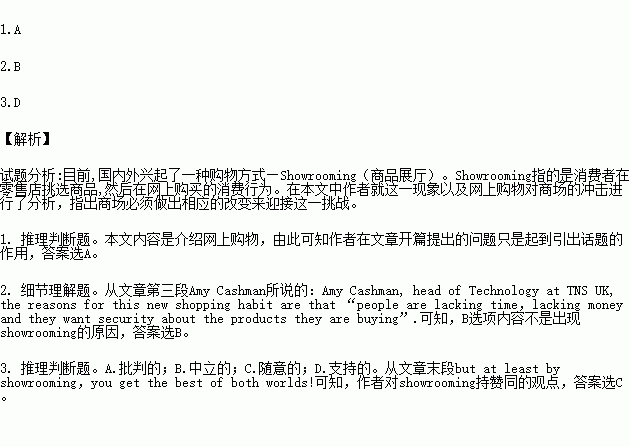题目内容
Do you like shopping? Or does the thought of wandering around the shops fill you with terror? For some of us, shopping is an enjoyable way of spending our spare time and our money. For me, it’s something I would rather avoid. Thank goodness for the Internet! It’s more convenient to buy CDs, electrical items, even food from the comfort of your sofa. But that’s not the only reason: price is an important factor. We can buy goods and services cheaper online. But sometimes the problem is knowing what to buy. This has led to a type of shopping called “showrooming”.
Showrooming is something I’ve done. I will go to a shop to see, touch and try out products but then go home and buy them online at a knock-down price. I’m not alone in doing this. Research by a company called Foolproof, found 24% of people showroomed while Christmas shopping in 2013.
Amy Cashman, head of Technology at TNS UK, says the reasons for this new shopping habit are that “people are lacking time, lacking money and they want security about the products they are buying”. She explains that consumers are not only shopping online at home but they are using the Internet in store or on their smartphones to shop around.
But does this mean technology will kill shops? Certainly shops will change. They will have to offer more competitive prices or encourage people to buy more by giving in-store discounts or free gifts.
We mustn’t forget that buying in a shop means you can get expert advice from the sales assistant and you can get good aftercare. It’s good to speak to a real human rather than look at a faceless computer screen, but at least by showrooming, you get the best of both worlds!
1.The two questions in Paragraph 1 are raised to ________.
A. introduce the topic
B. give two examples
C. compare different opinions
D. get answers from readers
2.According to Amy Cashman, which is not the reason for showrooming?
A. The lack of time.
B. The comfort of the sofa.
C. The shortness of money.
D. The security of the product.
3.The author’s attitude towards showrooming is ________.
A. criticalB. neutralC. casualD. supportive
 阳光课堂课时优化作业系列答案
阳光课堂课时优化作业系列答案
